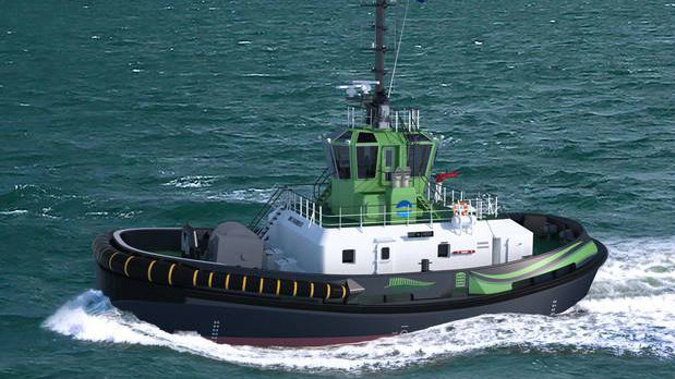
Ports of Auckland has signed a deal with a Dutch company to buy the world's first full-size fully electric tugboat which is expected to save the company $12 million in operating costs.
The six-metre tug, designed and manufactured by Damen Shipyards, will be delivered in 2021. The Damen RSD-E Tug 2513 model will have a 70 tonne bollard pull - the same as the port's current diesel tug boat Hauraki, also built by Damen.
Ports of Auckland chief executive Tony Gibson said the planned purchase was part of the company's plan to being zero emission by 2040.
"We set this goal because we recognise that urgent action is needed on climate change, and we wanted to be part of the solution. However, setting that goal created a tough challenge. We have a lot of heavy equipment, like tugs, and in 2016 there were no zero emission options," Gibson said in a statement.
Ports of Auckland began looking into the possibilities of buying an electric tugboat in 2016 - back then there was nothing on the market.
"We talked to several manufacturers about building a battery powered tug. They told us we were dreaming. Hybrid tugs were possible, they said, but not battery," Allan D'Souza, Ports of Auckland general manager of marine, engineering and general wharf operations, said.
/arc-anglerfish-syd-prod-nzme.s3.amazonaws.com/public/CTI2YLTVMVE43BJH4FAX53GUYA.jpg?width=469&height=654&mode=max)
The Damen RSD-E Tug will be delivered to Ports of Auckland in 2021. Photo / Supplied
D'Souza and the company's marine technical superintendent Rob Willighagen continued to speak to manufacturers about the possibility of an fully electric tug, and Damen Shipyards agreed to take on the challenge, Gibson said.
"I would like to acknowledge Damen for their work on this project since 2016. They have invested a significant amount of time and money to develop this innovative vessel. In the fight against climate change, partnerships are important, and Damen have been a great partner," he said.
James Shaw, Minister for Climate Change, said Ports of Auckland, like other businesses in the country, were finding ways to operate greener despite technology not yet enabling this.
"Many of the challenges we face with climate change will require solutions that aren't yet on the market. Ports of Auckland and an increasing number of other businesses across New Zealand are showing that won't stop them finding ways to meet our goals on greenhouse gas emission reductions," Smith said in a statement.
Auckland mayor Phil Goff said the deal showed commitment by the port to reduce its carbon emissions.
"The life of the tug is around 25 years. By going electric now, we save 25 years of diesel pollution and a net reduction in costs of around $2.5 million because it is so much cheaper to operate," Goff said.
"It's great for the environment, reducing pollution in the city centre and cutting back carbon emissions."
Gibson said the electric tug would cost the company roughly double what it paid for its current diesel tug. The company did not disclose the purchase price.
"The purchase price of this tug is significant, at roughly double that of a diesel tug, and that is an important consideration for a business that needs to make a profit. However, we are prepared to wear that up-front cost because our commitment to reduce emissions has to be more than just words," he said.
"The cost of operating an electric tug is less than a third of the cost of running a diesel tug, so while we pay more upfront, over the life of the tug we'll save around $12 million in operating costs, making our electric tug cheaper in the long term."
Ports of Auckland's current tugboat uses around 120 litres of diesel per hour.
Take your Radio, Podcasts and Music with you









